|
|
|
Sort Order |
|
|
|
Items / Page
|
|
|
|
|
|
|
| Srl | Item |
| 1 |
ID:
181856
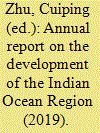

|
|
|
|
|
| Publication |
Singapore, Springer Nature, 2021.
|
| Description |
vi, 298p.hbk
|
| Series |
Research Series on the Chinese Dream and China's Development Path
|
| Standard Number |
9789811619816
|
|
|
|
|
|
|
|
|
|
|
|
Copies: C:1/I:0,R:0,Q:0
Circulation
| Accession# | Call# | Current Location | Status | Policy | Location |
| 060093 | 330.91824/ZHU 060093 | Main | On Shelf | General | |
|
|
|
|
| 2 |
ID:
180254


|
|
|
|
|
| Summary/Abstract |
Enclaves are the most distressed areas in the world where the ray of development hardly reaches. This study aims to evaluate the progress in the development in Dahagram–Angarpota enclave of Bangladesh after the initiation of 24-h open corridor access through the Indian territory in 2011. The study reveals that after 24-h open access through the corridor, the enclave achieved substantial positive changes in all the five indicators, namely, economic, social and infrastructural, technological, health and demographic indicators. However, the achievement in the four influential factors of development such as income, wealth, poverty and food security are still below the national level. Binary logistic regression model identified a positive change in income–wealth index of households through the changes in corridor access, education, electricity supply, number of livestock and involvement with micro credit. In the process of raising income–wealth, achieving food security and alleviating poverty, this study has suggested some policy recommendations that would guide different development programmes in the area.
|
|
|
|
|
|
|
|
|
|
|
|
|
|
|
|
| 3 |
ID:
062507


|
|
|
| 4 |
ID:
189866
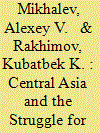

|
|
|
|
|
| Summary/Abstract |
The paper discusses the “struggle for Soviet legacy’ as a key concept for
understanding relations in Central Asia. This struggle is a path of dependent
development, in which the resources and values created in Soviet times
determine interstate relations in the 21st century. The authors argue that in
Central Asia this legacy rests mostly on the mega industries created during
the Soviet era, and national resources and practices of their distribution.
The paper concludes that in fact the struggle for Soviet legacy means
confrontation over the contours of new geoeconomics in Asia.
|
|
|
|
|
|
|
|
|
|
|
|
|
|
|
|
| 5 |
ID:
102786


|
|
|
|
|
| Publication |
2011.
|
| Summary/Abstract |
This paper explores how China's strategic motivations and calculations have both motivated and constrained its participation in East Asian regional cooperation. It argues that China's participation in regional economic and security cooperation is motivated first of all by the calculation of China's domestic interests to create a peaceful peripheral environment for its economic growth and political stability, particularly its frontier security and prosperity. The realist interests to enhance China's position in power competition with other major players in the region, particularly Japan and US, also play an important part in China's strategic calculation. These interest calculations, however, also set limits on China's participation in regional cooperation. These interest calculations have also shaped China's preference for an informal approach, emphasizing voluntarism and consensus building rather than legally binding resolutions, toward regional cooperation. This soft approach is a major barrier for many regional institutions to move beyond the stage of talking shops to effectively resolve conflicts in the region.
|
|
|
|
|
|
|
|
|
|
|
|
|
|
|
|
| 6 |
ID:
127910


|
|
|
|
|
| Publication |
2014.
|
| Summary/Abstract |
To cope with the excessive growth of energy consumption, the Chinese government has been trying to strengthen the energy regulation system by introducing new initiatives that aim at controlling the total amount of energy consumption. A partial frontier analysis is performed in this paper to make a comparative assessment of the combinations of possible energy conservation objectives, new constraints and regulation strategies. According to the characteristics of the coordination of existing regulation structure and the optimality of regulation strategy, four scenarios are constructed and regional responsibilities are reasonably divided by fully considering the production technology in the economy. The relative importance of output objectives and the total amount controlling is compared and the impacts on the regional economy caused by the changes of regulation strategy are also evaluated for updating regulation policy.
|
|
|
|
|
|
|
|
|
|
|
|
|
|
|
|
| 7 |
ID:
075405
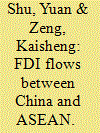

|
|
|
| 8 |
ID:
066963


|
|
|
| 9 |
ID:
147431


|
|
|
|
|
| Summary/Abstract |
As the country with the greatest energy consumption and CO2 emissions globally, China has commenced preparations for a nationwide carbon market, to be established during the period 2016–2020. Given the spatial heterogeneity of economic development across different regions, the nationwide market will have differing impacts on China's regional economies. The present paper uses a multi-regional CGE model to examine the effects of a nationwide carbon market on regional economies and CO2 reduction efficiency under different emission reduction targets. The results indicate that such a market can effectively reduce costs across the whole society, improving welfare and allocation efficiency of production factors and so reducing regional economic disparities and promoting coordinated regional development. These measures can help China to achieve more ambitious reduction targets with the same abatement costs, and large-scale inter-regional transfer of funds during emissions trading can be invested in CO2 mitigation technologies in economically backward regions, promoting CO2 reduction efficiency and industrial upgrading.
|
|
|
|
|
|
|
|
|
|
|
|
|
|
|
|
| 10 |
ID:
128521


|
|
|
|
|
| Publication |
2013.
|
| Summary/Abstract |
Asia is the most populous and rapidly urbanizing region in the world today and features 23 of the world's 40 biggest metropolitan areas. In many Asian countries, accelerated economic development, industrialization and urbanization have been accompanied by a growing acceptance that decentralization (the devolution of central state powers, responsibilities and resources to the sub-national scale)4 can lead to more effective and responsive governance in state, provincial, city and regency jurisdictions. This trend toward decentralized governance in Asia has often, but not always, been precipitated by a transition away from authoritarian regimes to more democratic forms of governance. Discourses about the desirability of democratic decentralization have typically emphasized the devolution of central state authority as the preferred means by which to empower communities and to increase the voice and participation of ordinary citizens in governmental decision-making processes that affect their lives and livelihoods. Thus, decentralization policies in urbanizing Asia have aimed to encourage the active involvement of urban residents in addressing shared dilemmas concerning issues such as environmental sustainability, public service delivery, community building and socio-political stability in often densely concentrated and ethnically diverse populations. At the same time, however, decentralization within the contexts of globalization and privatization may circumvent critical aspects of democratic procedure if sub-national government officials use their increased access to state power and resources to nurture clientelistic networks of patronage and/or to tap into wider circles of regional or global economic activity at the expense of local urban development.
|
|
|
|
|
|
|
|
|
|
|
|
|
|
|
|
| 11 |
ID:
129665


|
|
|
| 12 |
ID:
130975


|
|
|
|
|
| Publication |
2014.
|
| Summary/Abstract |
The present paper investigates how neighborhood effects are connected to chronic poverty. We examine a large sample of groups of households and find that neighborhood effects are significant in a majority of groups, especially in the poorest groups. People living in poor communities tend to suffer from poverty over time. It is of theoretical and empirical importance to explore how neighborhood effects are interrelated with chronic poverty and the channels through which this occurs. Unlike other econometric analyses, we establish a multilevel econometric model to show that: (i) it is difficult for an individual living in a neighborhood with a high proportion of agricultural labor, low education levels, and poor transport and telecommunication infrastructure to escape from poverty traps; (ii) neighborhood effects dominate in poor communities; and (iii) although poverty is affected by group-level factors, individual factors still play a dominant role in regards to escaping poverty when income surpasses a threshold level. Therefore, policy priority should be given to providing social protection and public services, especially in poor rural areas
|
|
|
|
|
|
|
|
|
|
|
|
|
|
|
|
| 13 |
ID:
057714
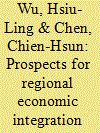

|
|
|
| 14 |
ID:
122076


|
|
|
| 15 |
ID:
113010


|
|
|
|
|
| Publication |
2012.
|
| Summary/Abstract |
The Pan Pearl River Delta (PPRD) Regional Co-operation Framework Agreement was signed in 2004. It aims to bring prosperity through partnership among nine Chinese Mainland provinces and China's two special administrative regions. In this paper, we use a dynamic panel data model to examine the economic growth of the PPRD economies from 1985 to 2009. Our analysis confirms the existence of regional growth spillover effects in the PPRD area. Our results also show that economic growth spillover effects of non-PPRD regions on the PPRD regions are greater than those among the PPRD members themselves. These findings imply that economic integration between Chinese provinces has generated considerable spillover effects on regional growth. However, the anticipated benefits of the implementation of the PPRD agreement have not been realized thus far. Therefore, greater effort should be made to promote further economic integration among these members so that their local economies can benefit from the positive spillover effects.
|
|
|
|
|
|
|
|
|
|
|
|
|
|
|
|
| 16 |
ID:
067095
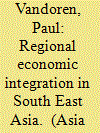

|
|
|
| 17 |
ID:
056683
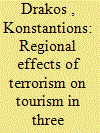

|
|
|
| 18 |
ID:
189306


|
|
|
|
|
| Summary/Abstract |
Cross-border cooperation between Russia and China is not only an important part of bilateral cooperation but also a stimulus for the accelerated development of frontier territories. Studies of its results over the past 30 years allow us to trace institutional changes in both countries, as well as general trends in their foreign trade and investment activity. The current state of Russian-Chinese cross-border cooperation is mainly characterized by gradually waning interest on both sides, which belies the growing number of state programs, framework agreements, and initiatives with major political support. China is increasingly cautious about transit benefits and prospects of industrial cooperation at the local level due to the small market capacity of the Russian Far East and its underdeveloped infrastructure. Both countries are displaying distrust, bilateral projects are becoming increasingly uncoordinated, their implementation is delayed, and the results are contrary to expectations. To understand the reasons for this imbalance, the authors consistently analyze the main dimensions and indicators of Russia-China cross-border cooperation, the specifics of the current legal and institutional framework, as well as the results of a number of state programs and major bilateral projects.
|
|
|
|
|
|
|
|
|
|
|
|
|
|
|
|
| 19 |
ID:
132530


|
|
|
|
|
| Publication |
2014.
|
| Summary/Abstract |
The Turkish economy has gradually liberalized and has become integrated into the regional and global economies since the 1980s. This article analyzes how the Turkish public evaluates the integration of the Turkish economy into the global economy, in particular, increasing trade ties, globalization, greater availability of foreign products and travel opportunities, the impact of multinational companies and international financial institutions. The evidence from Pew Global Attitudes Surveys shows that the Turkish public is overwhelmingly positive about certain changes such as increasing trade and availability of foreign products, whereas they are overwhelmingly negative about others such as the impact of multinationals and of immigration. Regression analyses demonstrate that these attitudes are shaped by individuals' perceptions of whether they have benefited from the liberalization of the economy.
|
|
|
|
|
|
|
|
|
|
|
|
|
|
|
|
|
|
|
|
|